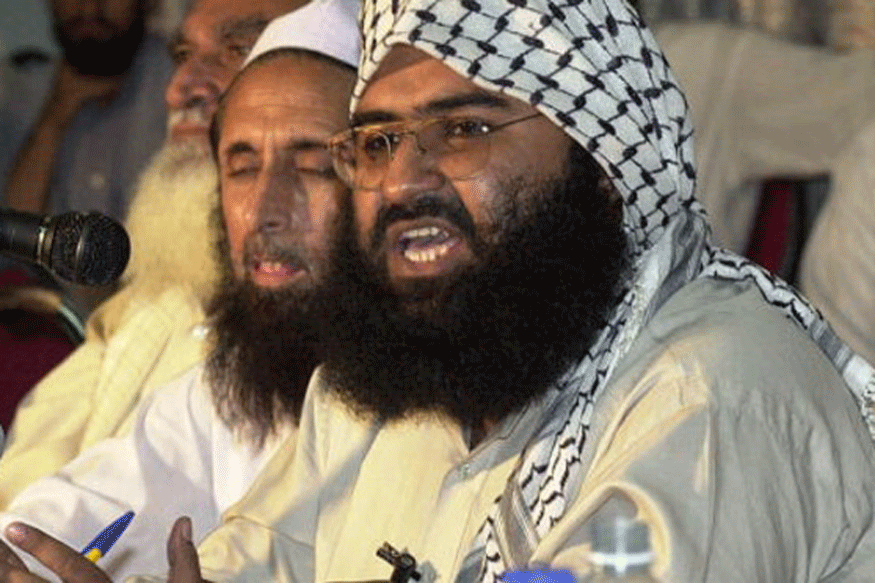As Global Community Unites Against Masood Azhar, China May Veto UN Sanctions on JeM Chief Again

The United Kingdom, United States and France on Wednesday proposed the UN Security Council impose sanctions on Pakistani-based militant outfit Jaish-e-Mohammad, which claimed responsibility for the gruesome Pulwama attack in Jammu and Kashmir.
This was the third attempt to put Masood Azhar, the leader and founder of JeM on the UN terror blacklist by which he would be subjected to a global travel ban, arms embargo and assets freeze. Earlier, China blocked this attempt twice – in 2016 and 2017.
Jaish-e-Mohammad was added to the terror list in 2001. Diplomats said they expected China to again raise objections.
The council has 10 days to consider the request from the three countries.
UN chief Antonio Guterres has also been in talks with both sides, urging them to urgently take steps to lower tensions through meaningful, mutual engagement and meet their responsibilities to maintain peace and security in the region.
India’s air strike on terror camp JeM in Balakot, Pakistan and Islamabad’s violation of Indian airspace multiple times on Wednesday fuelled fears of a disastrous confrontation in South Asia, prompting world powers to urge de-escalation of tensions between the nuclear-armed countries.
Countries across the globe have weighed in on the rising tensions between India and Pakistan, with many willing to mediate to de-escalate the situation.
On Wednesday, India and Pakistan both said that they downed each other's fighter jets, with Pakistan capturing an IAF pilot a day after Indian warplanes struck inside Pakistan for the first time since the 1971 war.
After the capture of an IAF pilot, New Delhi issued a demarche to the acting Pakistani deputy High Commissioner and handed over dossiers containing "specific details of JeM complicity in Pulwama terror attack, the presence of JeM terror camps and its leadership in Pakistan."
India has also called the Pakistani strike an 'unprovoked act of aggression.'
Most countries have asked for Pakistan to act upon terror organisations operating from its soil immediately.
The US has released several statements since the February 14 attack in Pulwama. President Trump had called the attack which killed 40 CRPF personnel ‘horrible’.
Days later, a statement released on February 26 by the US Department of State said Secretary of State Pompeo has already had a telephonic conversation with Sushma Swaraj and her Pakistani counterpart Qureshi. Additionally, it also came to light that NSA Ajit Doval too had briefed his American counterpart Bolton on India's air strike on Jaish-e-Mohammef training camp in Balakot.
Sri Lankan foreign ministry in a statement said it supports "peace and stability" in South Asia and all endeavours towards the "diffusion of tensions". It also called upon India and Pakistan to act in a manner that ensures peace, security and stability of the entire region.
China has repeatedly asked both countries to think of regional stability and peace and also called on both countries to exercise restraint.
Nepal, which is the current chair of SAARC, voiced a similar opinion and asked both India and Pakistan to not indulge in activities that would be a threat to regional peace and stability.
In a recent statement issued on Wednesday, the Pentagon has urged the two neighbours to avoid further military action.
“Acting Defence Secretary Patrick Shanahan has been in contact with the Secretary of State Mike Pompeo, National Security Advisor John Bolton, Chairman of Joint Chiefs of Staff Joseph Dunford, and Commander of US Central Command General Joseph Votel regarding India-Pakistan tensions. Acting Secretary Shanahan's focus is on de-escalating tensions and urging both of the nations to avoid further military action,” the Pentagon said in a statement.
News agencies have quoted a source in the White House as saying that the "potential risks associated with further military action by either side are unacceptably high for both countries, their neighbours, and the international community."
Canada, too, asked both India and Pakistan to exercise restraint and to avoid any further military escalation, adding that 'dialogue between India and Pakistan is needed to identify a durable diplomatic solution and maintain peace and security in the region.'
While there is no official word, Turkey, as per reports, has also offered to mediate between the two countries.
Russia said it was concerned about the current situation and willing to mediate between both countries to strengthen counter-terrorism potential. Further, Moscow called on both "sides to show restraint" and "step up efforts to resolve existing problems by political and diplomatic means."
In a statement, European Union said, "this has the potential to lead to serious and dangerous consequences for the two countries and the wider region." It also asked Pakistan to work towards eliminating terror activities on its soil.
The French government said it was closely monitoring the situation and called for de-escalation. It has also issued a travel advisory to its citizens travelling to India and Pakistan.
UK PM Theresa May became the first head of state to react when she, on Wednesday, said her country was "deeply concerned about rising tensions between India and Pakistan" and urged "dialogue and diplomatic solutions to ensure regional stability." The UK has also said it was coordinating with other partners via the UN to de-escalate the situation.
